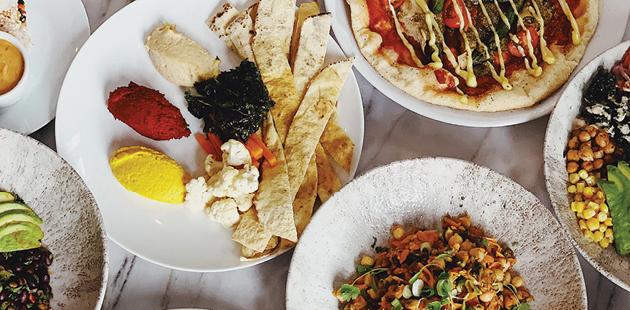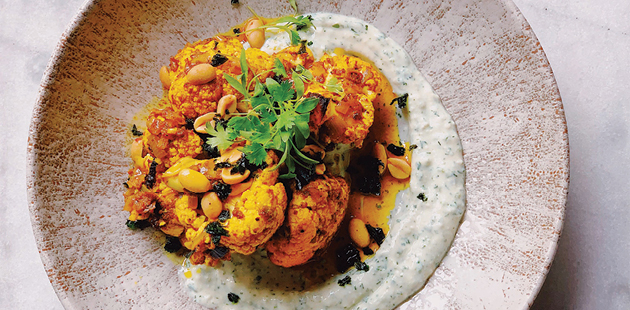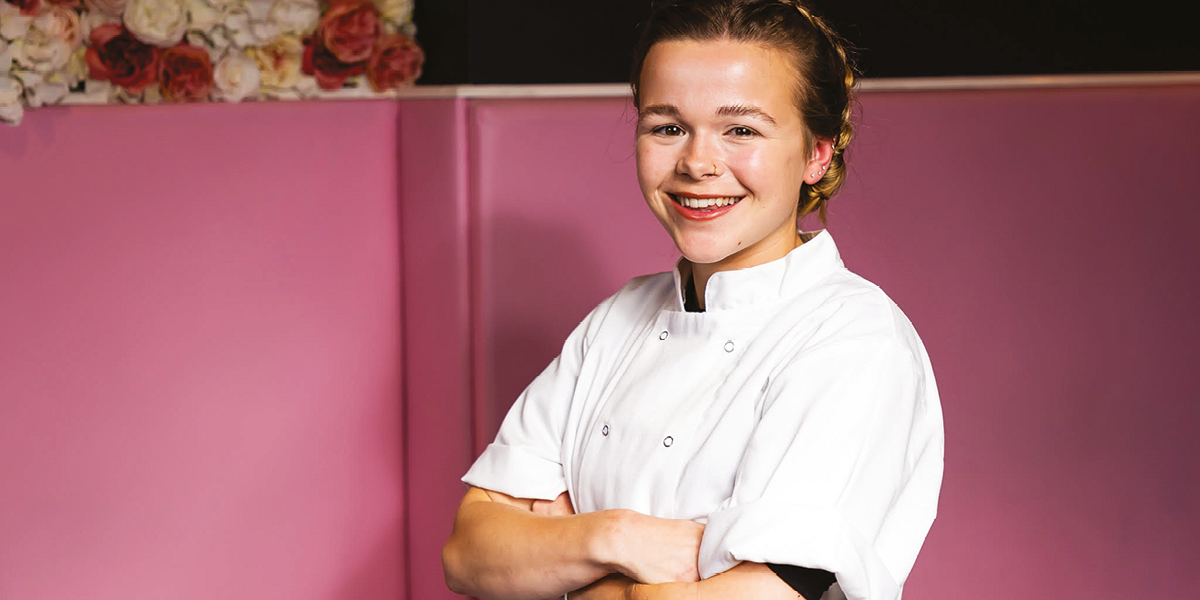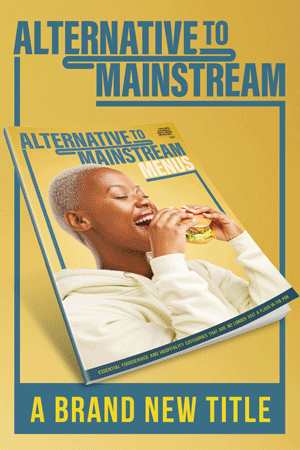Interview: Meg Greenacre, Erpingham House

Meg Greenacre speaks to Dine Out about switching to a vegan diet and how she transformed the menus at plant-based brand Erpingham House as executive chef by the age of 21
Erpingham House boasts in impressive spread across the UK, with established sites in Norwich, Brighton and now Edinburgh (as of June). And though its plant-based credentials are indisputable, there’s no denying that its menus look very different today than what was being served pre-2019. So what spurred its transformation from a purveyor of fairly predictable – though well-executed – vegan fare to a concept that pushes plant-based cuisine to its culinary limits, we hear you ask?
The answer is simple: Meg Greenacre. The 21-year-old joined the team as sous chef in 2019 and within a month had been promoted to head chef. Here she reflects on her cannonball career, which has seen her catapulted to the forefront of exhilarating vegan cuisine served by restaurants in the UK today.

You’ve made it to executive chef at a fairly young age, did you always want to cook?
I’ve known since I was able to stand that I wanted to be a chef. I started working when I was 14 in high school, getting experience at a restaurant and working as many hours as I could. Then I went to City College Norwich to train in professional cookery.
While I was there, I was worked at a restaurant called Relish in the city. I started from a fine dining background, being classically trained.
After I graduated, I then worked for a company called Bradsted’s – another fine dining company that’s well-known in Norfolk. I worked events and weddings with them, and even catered for royalty. It was an incredible place to work and get experience.
Do you follow a plant-based diet outside work?
Yes, and I literally did it overnight. I had a chat with a friend and the next day I was vegan. My dream was to always work in fine dining, and so when I turned vegan, I felt a little bit unsure about where I was headed – there aren’t many vegan places offering fine dining food.
So, I wanted to learn as much as possible in the vegan sector. I started at Erpingham House a year after turning vegan. I got very excited to learn a whole new style of cooking as a vegan chef. It’s a completely different standard of cooking to being a normal chef as there are so many new things to learn, and different techniques to adopt in order to get so much more flavour out of food, compared to when the flavour is just there already.
What were the menus like when you joined Erpingham House?
When I first joined a lot of the dishes on the menu were things you could do at home, or if you went to a pub and there would be one vegan option that was a curry, risotto or a chilli. So, it was really exciting to elevate it. Now, we’re so happy with what we’re serving and how far we’ve come. It’s been a big journey to get it to where it is now. Gradually over time, I got to apply my fine dining techniques to the menu. You’ve got to have the passion behind it to make it as creative as you can.
How did the existing customer base react to the changes?
They were used to having the previous menu. I don’t think they really knew how far vegan food could be pushed, especially in Norwich. Now we have a lot of vegans and non-vegans coming to dine with us. We have the Moving Mountains burger on the menu, which is a big hit with anyone who’s unsure of vegan food or is a big meat eater. So many people think it’s real meat. Our guests are all really happy and are enjoying the journey Erpingham House has embarked on.
Do the menus differ across the sites, considering the geographical spread?
The menus used to be different, but now they aren’t. It works so much better when they are more aligned. There are slight tweaks to suit each city, so there’s a few things in Brighton that the crowd there like a lot more than up in Norwich. For example, the burger in Norwich comes with twice cooked-chips, whereas in Brighton they come with new potatoes that have been smashed and made crispy.
Brighton has such a big vegan community, the most popular dishes there are mainly all the vegetables, such as cauliflower and aubergine. Whereas in Norwich our most popular dishes are those with fake meats. So, the ‘lamb’ dish and our burger.

What’s your signature dish?
The Celebration of Cauliflower. I try and focus on local, seasonal and fresh produce. And I absolutely hate food waste, it makes me really sad. One thing I’ve learnt from working in kitchens is the amount of waste – it’s quite shocking. This cauliflower dish represents who I am as a chef. The whole of the cauliflower is used: the stem for a purée, the leaves are braised and crispy and the florets are roasted.
Are sustainable kitchen practices important to you?
Definitely. In the kitchen, we give any waste and vegetable offcuts that can be used to a local animal sanctuary for feed. We offer carbon-free dining and we’re a plastic-free restaurant. And then there are other things like using Blue Bear Coffee, which seeks to eradicate slavery in the coffee supply chain.
Much of your time at the helm of the kitchen has been during the pandemic, what did you learn from the experience?
You must look at the positives. Here in Norwich, we’ve been cooking Erpingham House for collection and on Deliveroo, but we also now have two other takeaway brands in the kitchen. Loui Blake [who owns Erpingham House] set up Vegan Dough Co. a while ago, but we all set up Chuck Chick together during lockdown.
That’s a vegan, American concept with burgers, hotdogs and loaded fries, which kicked off incredibly well. We’re now looking to get a new place and new kitchen for Chuck Chick, which is insane. None of the chefs here ever thought we’d do anything like this.

How does it feel to have achieved so much at a young age?
It feels incredible. It’s hard to explain. I’m obviously so grateful for Loui to have given me this chance and trusted a 20-year-old female. I want to take it and do as much as I can, learn as much as possible and not let anyone down.
There aren’t many young female executive chefs in the sector either, are there?
I always worked in male dominant kitchens, where everyone tended to be a lot older. But I feel like it’s completely changed recently, especially since I’ve come to Erpingham House. I’d only ever worked with one female before, and since coming here, we have a kitchen that is pretty much female dominant. At first it was such an unfamiliar experience to have two young women working with me.
Has your time in older, male-run kitchens affected how you operate?
I’ve been very lucky and have always been in amazing kitchens where my head chef was a mentor figure. But I’ve heard lots of experiences where people haven’t been so lucky, and the chef world can be quite brutal.
I try and make this as happy a place as possible for everyone to be. I try to be understanding about hours and try and take everything I’ve learnt from before. Even if you have experienced a negative approach in the workplace, it helps you learn what not to do as a head chef.
What advice would you give to other young female chefs reading this?
Take any experience you can and push yourself, and you’ll see it’s surprising what you can actually do. I was incredibly shy when I was in college. My tutors think it’s amazing to see where I am now. I made sure I did competitions and took on any experience I could get, even though I was absolutely petrified to put myself out there. Pushing myself like that has got me to where I am. You’ll never know what you’re capable of unless you try.








